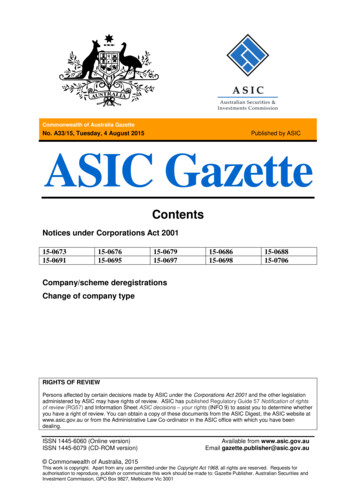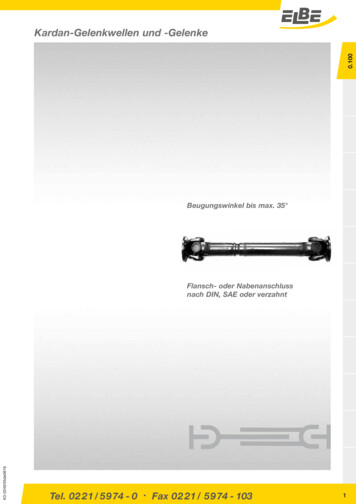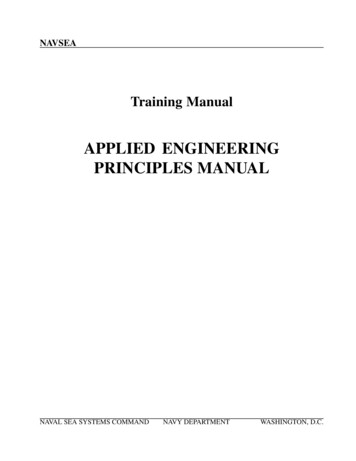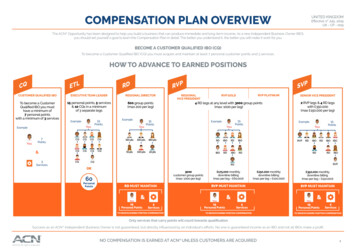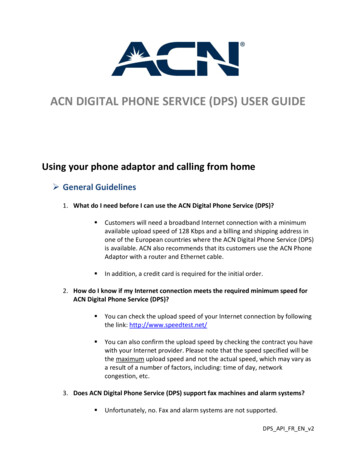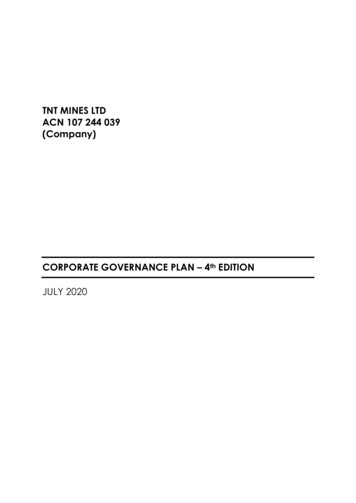
Transcription
TNT MINES LTDACN 107 244 039(Company)CORPORATE GOVERNANCE PLAN – 4th EDITIONJULY 2020
TABLE OF CONTENTS1.CORPORATE GOVERNANCE . 1SCHEDULE 1 – BOARD CHARTER . 2SCHEDULE 2 – CORPORATE CODE OF CONDUCT . 9SCHEDULE 3 – AUDIT AND RISK COMMITTEE CHARTER. 16SCHEDULE 4 – REMUNERATION COMMITTEE CHARTER. 22SCHEDULE 5 – NOMINATION COMMITTEE CHARTER . 26SCHEDULE 6 – PERFORMANCE EVALUATION POLICY. 30SCHEDULE 7 – CONTINUOUS DISCLOSURE POLICY . 31SCHEDULE 8 – RISK MANAGEMENT POLICY . 33SCHEDULE 9 – TRADING POLICY . 35SCHEDULE 10 – DIVERSITY POLICY . 42SCHEDULE 11 – WHISTLEBLOWER PROTECTION POLICY. 45SCHEDULE 12 – ANTI-BRIBERY AND ANTI-CORRUPTION POLICY . 60SCHEDULE 13 – SHAREHOLDER COMMUNICATIONS STRATEGY. 67i
1.CORPORATE GOVERNANCEThe Company is committed to complying with the highest standards of corporategovernance to ensure that all of its business activities are conducted fairly,honestly and with integrity in compliance with all applicable laws. To achieve this,the Company’s board of directors (Board) has adopted a number of charters andpolicies which aim to ensure that value is created whilst accountability andcontrols are commensurate with the risks involved.The Board believes that the Company’s policies and practices comply with therecommendations set out in the ASX Corporate Governance Principles andRecommendations – 4th Edition (Recommendations).Together with the Company’s constitution (Constitution), the following chartersand policies have been adopted by the Company to achieve a high standard ofcorporate governance:Charters and CodesBoard CharterCorporate Code of ConductAudit and Risk Committee CharterRemuneration Committee CharterNomination Committee CharterPoliciesPerformance Evaluation PolicyContinuous Disclosure PolicyRisk Management PolicyTrading PolicyDiversity PolicyWhistleblower Protection PolicyAnti-Bribery and Anti-Corruption PolicyShareholder Communications Strategy1
SCHEDULE 1 – BOARD CHARTER1.ROLE OF THE BOARDThe role of the Board is to provide overall strategic guidance and effectiveoversight of management. The Board derives its authority to act from theCompany’s Constitution.2.3.THE BOARD’S RELATIONSHIP WITH MANAGEMENT(a)The Board shall delegate responsibility for the day-to-day operations andadministration of the Company to the Chief Executive Officer/ManagingDirector.(b)Specific limits on the authority delegated to the CEO and the ExecutiveTeam must be set out in the Delegated Authorities approved by theBoard.(c)The role of management is to support the Chief ExecutiveOfficer/Managing Director and implement the running of the generaloperations and financial business of the Company including instilling andreinforcing the Company’s values, in accordance with the delegatedauthority of the Board.(d)In addition to formal reporting structures, members of the Board areencouraged to have direct communications with management andother employees within the Company and its subsidiaries (if any) (Group)to facilitate the effective carrying out of their duties as Directors.SPECIFIC RESPONSIBILITIES OF THE BOARDIn addition to matters it is expressly required by law to approve, the Board hasreserved the following matters to itself:(a)Driving the strategic direction of the Company and defining theCompany’s purpose, ensuring appropriate resources are available tomeet objectives and monitoring management’s performance.(b)Approving the Company’s statement of values and Code of Conduct toensure the desired culture within the Company is maintained andmonitoring the implementation of such values and culture at all times.(c)Ensuring that an appropriate framework exists for relevant information tobe reported by management to the Board.(d)When required, challenging management and holding it to account,(e)Appointment and replacement of the Chief Executive Officer/ManagingDirector, other senior executives and the Company Secretary and thedetermination of the terms and conditions of their employment includingremuneration and termination.(f)Approving the Company’s remuneration framework and ensuring it isaligned with the Company’s purpose, values, strategic objectives and riskappetite.(g)Monitoring the timeliness and effectiveness of reporting to shareholders.2
4.(h)Reviewing and ratifying systems of audit, risk management (for bothfinancial and non-financial risk) and internal compliance and control,codes of conduct and legal compliance to minimise the possibility of theCompany operating beyond acceptable risk parameters.(i)Approving and monitoring the progress of major capital expenditure,capital management and significant acquisitions and divestitures.(j)Approving and monitoring the budget and the adequacy and integrityof financial and other reporting such that the financial performance ofthe Company has sufficient clarity to be actively monitored.(k)Approving the annual, half yearly and quarterly accounts.(l)Approving significant changes to the organisational structure.(m)Approving decisions affecting the Company’s capital, includingdetermining the Company’s dividend policy and declaring dividends.(n)Recommending to shareholders the appointment of the external auditoras and when their appointment or re-appointment is required to beapproved by them (in accordance with the ASX Listing Rules ifapplicable).(o)Ensuring a high standard of corporate governance practice andregulatory compliance and promoting ethical and responsible decisionmaking.(p)Procuring appropriate professional development opportunities forDirectors to develop and maintain the skills and knowledge needed toperform their role as Directors effectively and to deal with new andemerging business and governance issues.COMPOSITION OF THE BOARD(a)The Board should comprise Directors with a mix of qualifications,experience and expertise which will assist the Board in fulfilling itsresponsibilities, as well as assisting the Company in achieving growth anddelivering value to shareholders.(b)In appointing new members to the Board, consideration must be given tothe demonstrated ability and also future potential of the appointee tocontribute to the ongoing effectiveness of the Board, to exercise soundbusiness judgement, to commit the necessary time to fulfil therequirements of the role effectively and to contribute to the developmentof the strategic direction of the Company.(c)The composition of the Board is to be reviewed regularly against theCompany’s Board skills matrix prepared and maintained by thenominations committee to ensure the appropriate mix of skills andexpertise is present to facilitate successful strategic direction and to dealwith new and emerging business and governance issues.(d)Where practical, the majority of the Board should be comprised of nonexecutive Directors who can challenge management and hold them toaccount as well as represent the best interests of the Company and itsshareholders as a whole rather than those of individual shareholders orinterest groups. Where practical, at least 50% of the Board should beindependent.3
5.6.(i)An independent Director is a director who is free of any interest,position or relationship that might influence, or reasonably beperceived to influence, in a material respect his or her capacityto bring an independent judgement to bear on issues before theBoard and to act in the best interests of the Company as a wholerather than in the interests of an individual shareholder or otherparty.(ii)In considering whether a Director is independent, the Boardshould consider the definition of what constitutes independenceas detailed in Box 2.3 of the ASX Corporate dRecommendations 4th Edition as set out in Annexure A(Independence Tests).(e)Prior to the Board proposing re-election of non-executive Directors, theirperformance will be evaluated by the Board who, due to the Company’ssize, also act as the Remuneration and Nomination Committee.(f)The Company must disclose the length of service of each Director in, orin conjunction with, its annual report (Annual Report).(g)The Company must disclose the relevant qualifications and experienceof each member of the Board in, or in conjunction with, its Annual Report.DIRECTOR RESPONSIBILITIES(a)Where a Director has an interest, position or relationship of the typedescribed in the Independence Tests, but the Board is of the opinion thatit does not compromise the independence of the Director, the Companymust disclose the nature of the interest or relationship in question and anexplanation of why the Board is of that opinion.(b)Directors must disclose their interests, positions or relationships. Theindependence of the Directors should be regularly assessed by the Boardin light of the interests disclosed by them.(c)Directors are expected to bring their independent views and judgementto the Board and must declare immediately to the Board any potentialor active conflicts of interest.(d)Directors must declare immediately to the Board, and the Board willdetermine whether to declare to the market, any loss of independence.(e)No member of the Board (other than a Managing Director) may serve formore than three years or past the third annual general meeting followingtheir appointment, whichever is the longer, without being re-elected bythe shareholders.THE ROLE OF THE CHAIRMAN(a)The Chairman of the Board is responsible for the leadership of the Board,ensuring it is effective, setting the agenda of the Board, conducting theBoard meetings, ensuring then approving that an accurate record of theminutes of Board meetings is held by the Company and conducting theshareholder meetings.4
7.(b)Where practical, the Chairman of the Board should be a non-executiveDirector. If a Chairman of the Board ceases to be an independentDirector then the Board will consider appointing a lead independentDirector.(c)Where practical, the Chief Executive Officer/Managing Director shouldnot be the Chairman of the Board of the Company during his term asChief Executive Officer/Managing Director or in the future.(d)The Chairman of the Board must be able to commit the time to dischargethe role effectively.(e)The Chairman of the Board should facilitate the effective contribution ofall Directors and promote constructive and respectful relations betweenBoard members and management.(f)In the event that the Chairman of the Board is absent from a meeting ofthe Board then the Board shall appoint a Chairman for that meeting inan acting capacity.BOARD COMMITTEES(a)Once the Board is of a sufficient size and structure, reflecting that theCompany’s operations are of a sufficient magnitude, to assist the Boardin fulfilling its duties, the Board must establish the following committees,each with written charters:(i)audit and risk committee;(ii)remuneration committee; and(iii)nomination committee.(b)The charter of each committee must be approved by the Board andreviewed following any applicable regulatory changes.(c)The Board will ensure that the committees are sufficiently funded toenable them to fulfil their roles and discharge their responsibilities.(d)Members of committees are appointed by the Board. The Board mayappoint additional Directors to committees or remove and replacemembers of committees by resolution.(e)The Company must disclose the members and Chairman of eachcommittee in, or in conjunction with, its Annual Report.(f)The minutes of each committee meeting shall be provided to the Boardat the next occasion the Board meets following approval of the minutesof such committee meeting.(g)The Company must disclose in, or in conjunction with, its Annual Report,in relation to each reporting period relevant to a committee, the numberof times each committee met throughout the period and the individualattendances of the members at those committee meetings.(h)Where the Board does not consider that the Company will benefit from aparticular separate committee:5
(i)8.9.(i)the Board must carry out the duties that would ordinarily beassigned to that committee under the written terms of referencefor that committee; and(ii)the Company must disclose in, or in conjunction with, its AnnualReport:(A)the fact a committee has not been established; or(B)if an audit and risk committee has not been established,the processes the Board employs that independentlyverify and safeguard the integrity of its financialreporting, including the processes for the appointmentand removal of the external auditor and the rotation ofthe audit engagement partner, and the process itemploysforoverseeingtheCompany’sriskmanagement framework.The Board does not believe it is as yet of a sufficient size and structure torequire an Audit and Risk Committee, Remuneration Committee orNomination Committee, this is reviewed each year.BOARD MEETINGS(a)The Directors may determine the quorum necessary for the transaction ofbusiness at a meeting, however, until otherwise determined, there mustbe two Directors present at a meeting to constitute a quorum.(b)The Board will schedule formal Board meetings at least quarterly and holdadditional meetings, including by telephone, as may be required.(c)Non-executive Directors may confer at scheduled times withoutmanagement being present.(d)The minutes of each Board meeting shall be prepared by the CompanySecretary, approved by the Chairman of the Board and circulated toDirectors after each meeting.(e)The Company Secretary shall ensure that the business at Board andcommittee meetings is accurately captured in the minutes.(f)The Company Secretary shall co-ordinate the timely completion anddistribution of Board and committee papers for each meeting of theBoard and any committee.(g)Minutes of meetings must be approved at the next Board meeting.(h)Further details regarding Board meetings are set out in the Company’sConstitution.THE COMPANY SECRETARY(a)When requested by the Board, the Company Secretary will facilitate theflow of information of the Board, between the Board and its committeesand between senior executives and non-executive Directors.(b)The Company Secretary is accountable directly to the Board, through theChairman of the Board, on all matters to do with the proper functioningof the Board.6
10.(c)The Company Secretary is to facilitate the induction and professionaldevelopment of Directors.(d)The Company Secretary is to facilitate and monitor the implementationof Board policies and procedures.(e)The Company Secretary is to provide advice to the Board on corporategovernance matters, the application of the Company’s Constitution, theASX Listing Rules and applicable other laws.(f)All Directors have access to the advice and services provided by theCompany Secretary.(g)The Board has the responsibility for the appointment and removal, byresolution, of the Company Secretary.ACCESS TO ADVICE(a)All Directors have unrestricted access to Company records andinformation except where the Board determines that such access wouldbe adverse to the Company’s interests.(b)All Directors will receive briefings on material developments in laws,regulations and accounting standards relevant to the Company.(c)All Directors may consult management and employees as required toenable them to discharge their duties as Directors.(d)All new Directors will be offered induction training, tailored to their existingskills, knowledge and experience, to position them to discharge theirresponsibilities effectively and to add value. This will include:(e)11.(i)training on legal duties and responsibilities as a Director under thekey legislation governing the Company and the ASX Listing ngrequirements); and(ii)training on accounting matters and on the responsibilities ofDirectors in relation to the Company’s financial statements.The Board, committees or individual Directors may seek independentexternal professional advice as considered necessary at the expense ofthe Company, subject to prior consultation with the Chairman of theBoard. A copy of any such advice received is made available to allmembers of the Board.FOREIGN DIRECTORSIn the event that a Director does not speak the language in which key corporatedocuments are written or Board or shareholder meetings are held, the Companywill ensure that:(a)such documents are translated into the Director’s native language; and(b)a translator is present at all Board and shareholder meetings.In this case, “key corporate documents” includes the Company’s Constitution,prospectuses, product disclosure statements, corporate reports and continuousdisclosure announcements.7
12.PERFORMANCE REVIEW13.The Board shall conduct an annual performance review of the Board that:(a)compares the performance of the Board with the requirements of itscharter;(b)critically reviews the mix of the Board to ensure it covers the skills neededto address existing and emerging business and governance issuesrelevant to the Company and to ensure the currency of each Director’sknowledge and skills and whether the Director’s performance has beenimpacted by other commitments; and(c)suggests any amendments to this charter as are deemed necessary orappropriate.(d)This function will be replaced by a Nomination Committee as and whenrequired8
SCHEDULE 2 – CORPORATE CODE OF CONDUCT1.PURPOSEThe purpose of this Code of Conduct is to provide a framework for decisions andactions in relation to ethical conduct in employment. It underpins the Company’scommitment to integrity and fair dealing in its business affairs and to a duty of careto all employees, clients and stakeholders. The document sets out the principlescovering appropriate conduct in a variety of contexts and outlines the minimumstandard of behaviour expected from employees.2.VALUES2.1Identity(a)2.22.3The Company is a junior ASX-listed explorer focused on the evaluationand development of undervalued, large-scale mining and brownfieldsexploration assets in tier one jurisdictions.Purpose(a)Our primary objective is to deliver maximum shareholder value throughprofitable growth and the development of stable and sustainableprojects whilst acting lawfully, ethically and responsibly.(b)The Company will pursue operational and commercial excellence byusing best practice approaches in our decision-making process focusingon continuous development, accountability and teamwork in all aspectsof our business. A key attribute to this approach is maintaining responsiblelong-term management.(c)In order to achieve these goals, we will ensure our employees andbusiness partners have the appropriate skills and resources to performtheir work effectively and efficiently and that all stakeholders (includinginvestors, suppliers and regulators) are aware of the Company’s valuesand our intention to uphold them. We will foster an open and supportiveenvironment in all activities and relationships, and make sure that oursenior executives demonstrate and reinforce our values in all aspects ofour business and in all interactions with staff to perform their workeffectively, efficiently and safely and to minimize the impact of theCompany’s activities on the environment and communities within whichwe operate.(d)We believe that our pursuit of these goals will cement a positivereputation for TNT Mines in the community as a reliable, responsible andethical organisation.Commitment to values(a)The Company is committed to conducting all of its business activities inaccordance with the above stated values. The Board will ensure that allemployees are given appropriate training on the Company’s values andsenior executives will continually demonstrate and reinforce such valuesin all interactions with staff.(b)A copy of the Company’s statement of values will be available on itswebsite.9
3.ACCOUNTABILITIES3.1Managers and SupervisorsManagers and supervisors are responsible and accountable for:3.2(a)undertaking their duties and behaving in a manner that is consistent withthe provisions of the Code of Conduct;(b)the effective implementation, promotion and support of the Code ofConduct in their areas of responsibility; and(c)ensuring employees under their control understand and follow theprovisions outlined in the Code of Conduct and receive appropriatetraining in respect of the Code of Conduct.EmployeesAll employees are responsible for:4.(a)understanding and complying with the Code of Conduct. To this end,regular and appropriate training on how to comply with this Code ofConduct will be provided to all employees;(b)undertaking their duties in a manner that is consistent with the provisionsof the Code of Conduct;(c)reporting suspected corrupt conduct in accordance with the Company’sWhistleblower Protection Policy and Anti-Bribery and Anti-CorruptionPolicy; and(d)reporting any departure from the Code of Conduct by themselves orothers.PERSONAL AND PROFESSIONAL BEHAVIOURWhen carrying out your duties, you should:(a)behave honestly and with integrity and report other employees who arebehaving dishonestly;(b)treat fellow employees with respect and not engage in bullying,harassment or discrimination;(c)disclose and deal appropriately with any conflicts between your personalinterests and your duty as a director, senior executive or employee (asapplicable);(d)not take advantage of the property or information of the Company or itscustomers for personal gain or to cause detriment to the Company or itscustomers;(e)not take advantage of your position for the opportunities arisingtherefrom for personal gain;(f)carry out your work with integrity and to a high standard and in particular,commit to the Company’s policy of producing quality goods andservices;10
5.(g)operate within the law at all times;(h)act in the best interests of the Company;(i)follow the policies of the Company and adhere to the Company’s values;and(j)act in an appropriate business-like manner when representing theCompany in public forums and deal with customers and suppliers fairly.CONFLICT OF INTERESTPotential for conflict of interest arises when it is likely that you could be influenced,or it could be perceived that you are influenced, by a personal interest whencarrying out your duties. Conflicts of interest that lead to biased decision makingmay constitute corrupt conduct.(a)Some situations that may give rise to a conflict of interest includesituations where you have:(i)financial interests in a matter the Company deals with or you areaware that your friends or relatives have a financial interest in thematter;(ii)directorships/management of outside organisations;(iii)membership of boards of outside organisations;(iv)personal relationships with people the Company is dealing withwhich go beyond the level of a professional working relationship;(v)secondary employment, business, commercial, or other activitiesoutside of the workplace which impacts on your duty andobligations to the Company;(vi)access to information that can be used for personal gain; and(vii)offer of an inducement.(b)You may often be the only person aware of the potential for conflict. It isyour responsibility to avoid any conflict from arising that couldcompromise your ability to perform your duties impartially. You mustreport any potential or actual conflicts of interest to your manager.(c)If you are uncertain whether a conflict exists, you should discuss thatmatter with your manager and attempt to resolve any conflicts that mayexist.(d)You must comply with the Company’s Anti-Bribery and Anti-CorruptionPolicy at all times. You must not submit or accept any bribe, or otherimproper inducement. Any such inducements are to be reported to yourmanager.6.INFORMATION SYSTEMS, DEVICES AND SOCIAL MEDIA/NETWORKING6.1Information SystemsEmail, the internet, facsimile, telephones and other information systems must beused appropriately so as to maintain and not put at risk the integrity of the11
Company’s information systems. Divisions and business units have policies in placeto manage risks associated with information technology systems and their use.Employees must comply with the requirements of those policies at all times.6.2Bring Your Own DevicesEmployees linking personal devices to the Company’s information systems mustensure they first obtain appropriate authorisation and use such devices inaccordance with all relevant divisional/business unit policies.6.3Social Media/NetworkingEmployees must ensure that they use any social media and networking sites inaccordance with the requirements of the Code of Conduct and relevant policies.7.8.PUBLIC AND MEDIA COMMENT(a)Individuals have a right to give their opinions on political and social issuesin their private capacity as members of the community.(b)Employees must not make official comment on matters relating to theCompany unless they are:(i)authorised to do so by the Chief Executive Officer/ManagingDirector; or(ii)giving evidence in court; or(iii)otherwise authorised or required to by law.(c)Employees must not release unpublished or privileged information unlessthey have the authority to do so from the Chief ExecutiveOfficer/Managing Director.(d)The above restrictions apply except where prohibited by law, for examplein relation to “whistleblowing”. Employees should refer to the Company’sWhistleblower Protection Policy for further information.USE OF COMPANY RESOURCESRequests to use Company resources outside core business time should be referredto management for approval.If employees are authorised to use Company resources outside core businesstimes, they must take responsibility for maintaining, replacing, and safeguardingthe resources and following any special directions or conditions that apply.Employees using Company resources without obtaining prior approval could facedisciplinary and/or criminal action. Company resources are not to be used for anyprivate commercial purposes.9.SECURITY OF INFORMATIONEmployees are to make sure that confidential and sensitive information cannotbe accessed by unauthorised persons. Sensitive material should be securelystored overnight or when unattended. Employees must ensure that confidentialinformation is only disclosed or discussed with people who are authorised to haveaccess to it.12
It is considered a serious act of misconduct to deliberately release confidentialdocuments or information to unauthorised persons, and may incur disciplinaryaction.10.INTELLECTUAL PROPERTY/COPYRIGHTIntellectual property includes the rights relating to scientific discoveries, industrialdesigns, trademarks, service marks, commercial names and designations, andinventions and is valuable to the Company.The Company is the owner of intellectual property created by employees in thecourse of their employment unless a specific prior agreement has been made.Employees must obtain written permission to use any such intellectual propertyfrom the Company Secretary/Chairman of the Board before making any use ofthat property for purposes other than as required in their role as employee.11.DISCRIMINATION AND HARASSMENTEmployees must not harass, discriminate, or support others who harass anddiscriminate against colleagues or members of the public on the grounds ofgender, marital or family status, sexual orientation, gender identity, age,disabilities, ethnicity, religious beliefs, cultural background, socio-economicbackground, perspective or experience.Such harassment or discrimination may constitute an offence under legislation.The Company’s executives should understand and apply the principles of equalemployment opportunity.12.CORRUPT CONDUCTEmployees must comply with the Company’s Anti-Bribery and Anti-CorruptionPolicy at all times.Corrupt conduct involves the dishonest or partial use of power or position whichresults in one person/group being advantaged over another. Corruption can takemany forms including, but not limited to:(a)official misconduct;(b)bribery and blackmail;(c)unauthorised use of confidential information;(d)fraud; and(e)theft.Corrupt conduct will not be tolerated by the Company. Disciplinary action up toand including dismissal will be taken in the event of any employee participatingin corrupt conduct.Employees should refer to the Company’s Whistleblower Protection Policy inrespect of reporting corrupt conduct, conduct in breach of any of the Company’spolicies or its Code of Conduct.13
13.OCCUPATIONAL HEALTH AND SAFETYIt is the responsibility of all employees to act in accordance with the occupationalhealth and safety legislation, regulations and policies applicable to theirrespective organisations and to use security and safety equipment provided.Specifically, all employees are responsible for safety in their work area by:14.(a)following the safety and security directives of management;(b)advising management of areas where there is a potential problem insafety and reporting suspicious occurrences; and(c)minimising risks in the workplace.LEGISLATIONIt is essential that all employees comply with the laws and regulations of thecountries in which we operate. Violations of such laws may have seriousconsequences for the Company and any individuals concerned. Any knownviolation m
as detailed in Box 2.3 of the ASX Corporate Governance Council's Corporate Governance Principles and Recommendations 4 th Edition as set out in Annexure A (Independence Tests). (e) Prior to the Board proposing re-election of non-executive Directors, their performance

